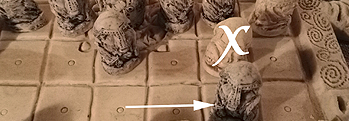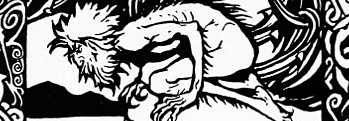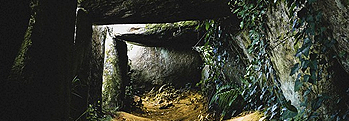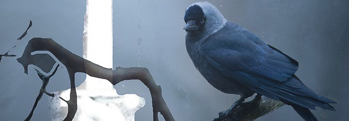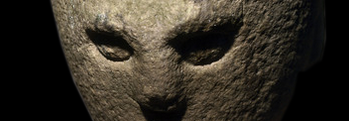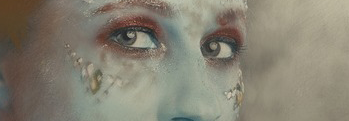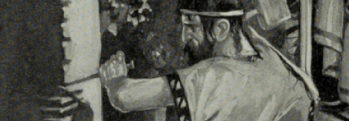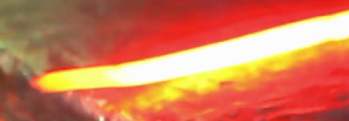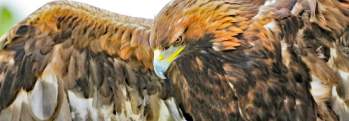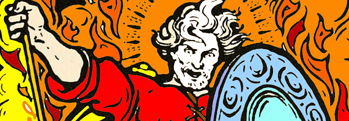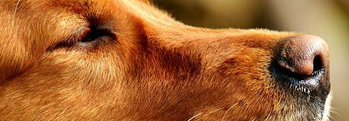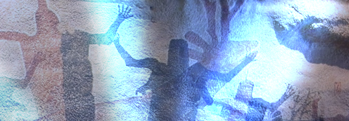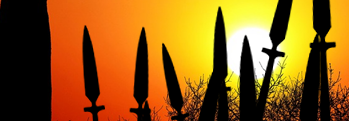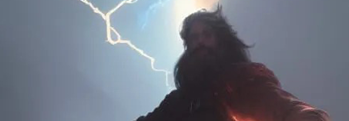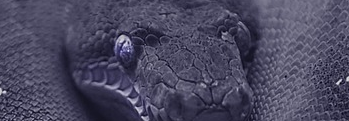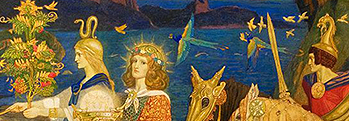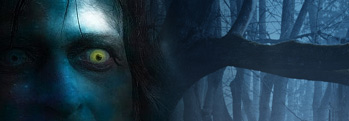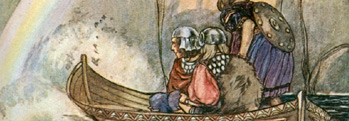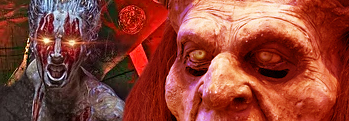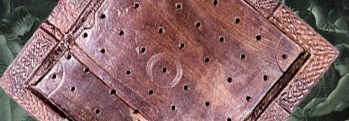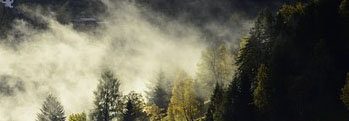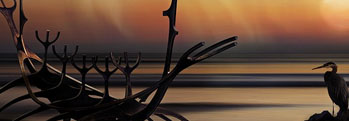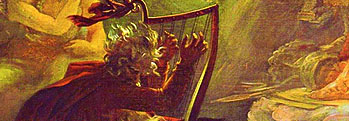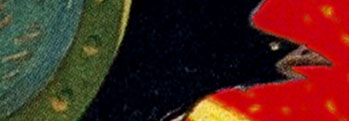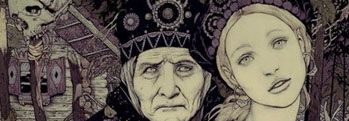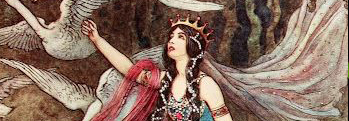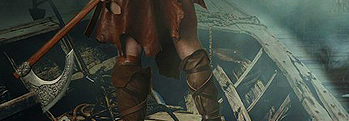Tuan
Irish and Celtic myths and legends, Irish folklore and Irish fairy tales from the Mythological Cycle
The Oldest of them All
 There is a tale, one of the oldest stories among the many very ancient stories of Ireland, of a man who returned to life as a man thousands of years after he first walked the earth.
There is a tale, one of the oldest stories among the many very ancient stories of Ireland, of a man who returned to life as a man thousands of years after he first walked the earth.
His legend was found in an eleventh century manuscript called Lebor na hUidre, which means The Book of Dun Cow, and it was written there by the followers of an early Christian Saint called Finnian of Moville.
The good Saint, centuries before, had recorded meeting a man who at that time went by the name of Tuan Mac Cairill, and who swore he had lived many lives and witnessed many deeds in Ireland. Finnian had travelled north upon hearing that there were yet people in Donegal who believed in pagan gods, and he had a mind to unmask these gods for what they really were!
When he arrived he learned of a man, wise and hardy, who was claimed to be a magician and who observed neither the days of the Saints nor Sundays. Finnian was wroth and swore to educate this fellow and put his wisdom to the test, and stormed off to bang on the gates of this man’s Dún, or fortress.
Finnian demanded entrance so that he could shine a light on the wickedness of the old ways and old gods, and banish forever their power over Ireland.
But the man within refused him and shuttered his doors and windows, continuing his ancient practices and blocking his ears to the rattling. He feared not the Saint for he feared not death nor time itself! He leaped over the scythe, he dodged under it, and the only occasion on which time laughs is when he chances upon Tuan, the son of Cairill, the son of Muredac Red-neck.
Well I’ll tell you, Finnian was seized with even greater wrath, but calling upon the power of God, he controlled himself and settled on a plan of action. He would sit outside the fortress and fast, praying loudly, until he was granted entry, relying on the idea that the occupant of the stronghold wouldn’t sit idly by and let someone die famished on his doorstep, in defiance of the laws of hospitality.
The man inside thought about it carefully and decided that he’d wait until the Saint gave in and fled from hunger’s gnawing at his wits, lifting the siege and leaving him in peace. But the mighty abbot wouldn’t give in so easily, and he sat down on a spot just beyond the door. He bent his gaze on the ground between his feet, and entered into a meditation from which he would only be released by admission or death
The man inside and his servants peered through spy-holes day after day, hope slowly beginning to fade that this insistent visitor would take himself up and go elsewhere, but day after day the servants returned with the same message:
“The new druid is still there,” they said.
As time passed, the servants grew more and more uneasy, for none were able to come or go from the place while this strange man sat outside. Oftentimes they would pace up and down and sometimes scream unexpectedly, for they felt mystic energies ebbing and flowing around them, pulling at their souls like implacable spiritual riptides.
“He has his own troubles,” they said. “It is a combat of the gods that is taking place.”
“If,” said one irritable guard, “What if we buzzed a spear at the persistent stranger, or if one slung at him with a jagged pebble?”
“What!” his master demanded wrathfully, “is a spear to be thrown at an unarmed stranger? And from this house!” And he gave that man a clip on the ear. He rounded on the rest and told them to be still, and that the hunger would drive away the strange by the morning at latest.
"Be at peace all of you," he said, "for hunger has a whip, and he will drive the stranger away in the night."
But the strange didn’t leave, and in the morning the lord of the hosue threw his hands in the air and gave up. The gate of the Dún swung wide and Finnian was carried inside, being unable to walk for hunger and exposure, but he was tough in body and mind and was quickly up and about.
Finnian had beaten the disease of Mugain, he had beaten his own pupil the great Colmcille and he beat Tuan too, opening his heart as he had opened the gates of his home.
The two spoke long and long, and the master of the house, whose name was Tuan, learned much of the new faith. He wished to meditate upon this knowledge but the Saint insisted that Tuan speak of himself before they ate, over the objections of Tuan.
Tuan pleaded, “Let the past be content with itself, for man needs forgetfulness as well as memory.”
But Finnian reminded him that deeds must be confessed before they can be forgiven, and sat until Tuan spoke, reciting his ancestors and family line, a matter of great importance in Ireland in that time. He quickly became confused however when Tuan started to recite two family trees, one more recent and one from very long ago – just after the flood!
Finnian pushed back his chair and leapt to his feet, his blood running cold as he looked upon his host with new eyes, but he could find no lie there. He then reached for the peace of God and found it, slowly seating himself again.
Tuan spoke on, relating tales of long-gone heroes as though he had shaken their hands only this morning. Of Partholon who first came to Ireland after the floodwaters receded he said was accompanied by forty eight, half men and half women, the first to set foot in Ireland since the tall walls of ice marched implacably across the world, although who can say what came before?
A strange land they saw, one great forest from coast to coast, rich with birdsong beneath a warm and beautiful sun, and they built the first city there beside a roaring river. Fish and game aplenty were to be had, salmon pink, badgers, deer and rabbits, and more – strange wild shy monsters roamed freely, and shadows and spirits still haunting the world long after their bodies had drowned, creatures that you could see and walk through!
From those two dozen couples came no less than five thousand, although some say they were slow of wit, until over the course of a day and night a dark wind blew from some hidden fetid place creaking wide beneath the earth, unleashing a dreadful plague which killed the whole race of Parthalon – except one, Tuan himself.
Tuan fled, lost and terrified, into the endless forests, starting at the chirp of birds and the creak of trees, stalked by wolves and bears who sensed his weakness. He hid in a cleft rock, feared by nothing, for more than twenty years until he was more beast than man himself, and had forgotten much that men knew.
Then one day as he pawed through the dunes for shellfish to crack with a rock, he lifted his head to spy a fleet of thirty four wide ships sailing towards the shore! Bright were their sails and fair their people, so he leaped for joy and followed the fleet along the coast like a goat, springing from rock to rock, until he stopped at a pool for a drink of water.
There he caught a glimpse of himself and was horrified to see his unkempt state and wild eyes looking back at him. He looked like neither man nor beast, with curved claws and withered, wrinkled skin, so he sat by the pool weeping for his loneliness and wildness, ashamed to make himself known and filled with sorrow for his life.
But a terrible storm arose and when he looked down from the tall clifftop he saw the fleet rolling and tossed by fierce waves. At times they were pitched against the sky and staggered aloft, spinning gustily there like wind-blown leaves.
Then they were hurled from these dizzy tops to the flat, moaning gulf, to the glassy, inky horror that swirled and whirled between ten waves. At times a wave leaped howling under a ship, and with a buffet dashed it into air, and chased it upwards with thunder stroke on stroke, and followed again, close as a chasing wolf, trying with hammering on hammering to beat in the wide-wombed bottom and suck out the frightened lives through one black gape.
A wave fell on a ship and sunk it down with a thrust, stern as though a whole sky had tumbled at it, and the barque did not cease to go down until it crashed and sank in the sand at the bottom of the sea.
Impenetrable night drew a cloak over the ruin and horror of the children of Nemed, drawn by a vicious wind that strode the world long-legged, hiding all but the most piteous cries with its harsh whipcracks. Trees were pulled from the earth and leaped into the air, and the very boulders crashed down as though the land itself was trying to destroy the arrivals.
Tuan laid himself upon the earth then and slept, and in his dream he became a great stag of the forests and felt the beating of a new heart within himself. When he awoke he found it was no dream, for he had in truth become that stag! Or perhaps his spirit passed into a lord of the woods.
Starin, fierce is the man,
I dread Scemel of the white shield,
Andind will not save me, though good and fair,
If it were Beoin
Though Beothach would leave me alive,
Cacher’s rough fight is rough,
Britan achieves valour with his spears,
There is a fit of fury on Fergus.
They are coming towards me, O gentle Lord,
The offspring of Nemed, Agnoman’s son,
Stoutly they are lying in wait for my blood,
To compass my first wounding.
Then there grew upon my head
Two antlers with three score points,
So that I am rough and grey in shape
After my age has changed from feebleness.
He stood for a while tamping and breathing deep of the fresh air in amazement, tasting youth and savouring the sharpness of his new senses, until he smelled his own deer kind and belled loudly with joy! He bounded light as a feather, launching himself ten meters at a spring, caressed by the gentled wind. None of his former tormentors would meet his eye, neither bear nor wolf could stand before him, and he reigned as king of the stags in Ireland.
Eventually a time came when he smelled once again the scent of men, and he went to the north where Nemed and four couples had been saved from the wreck. He carefully drew near, knowing they would recognise him not, and saw them increase and multiply until four thousand couples lived and laughed and were riotous in the sun, for the people of Nemed had small minds but great activity. They were savage fighters and hunters.
And yet when he returned, to his grief he saw they were gone, the place that knew them and that they called home was silent, and only their bones glinted in the sun.
Age came upon him after that, and when his mighty head bowed for the last time, he returned to the cave he had lived in when he was an old man, and was besieged by hungry wolves who swore he would be their next dinner. Proud yet, he agreed he would fight them on the morrow, knowing their tongue, and he lay down to sleep.
But as he slept he felt another change come upon him, and the long limbs of the stag became the sturdy legs of a boar with sharp tusks and a grisly gleam in his eye!
He heard the wolves call in mockery, and he answered with ferocity, tossing them up and reddening the loam with their blood, joyful in battle, a killer, a champion, a boar who could not be defied.
He took upon himself the lordship of all of the boars in Ireland, feared by hunting creatures and uncanny walkers in the wind both, guardian of his tribes, sending even powerful bears fleeing with a whimper.
Only one creature did he not challenge, for men had once again returned to Ireland. Semion, the son of Stariath, with his people, from whom the men of Domnann and the Fir Bolg and the Galiuin are descended. These he did not chase, and when they chased him he fled, for no beast is ever truly a match for men.
Yet he often waited near to their settlements and listened, and remembered bitterly when his voice had been heard at the council table, and when the eyes of women would brighten to hear him sing. Little did he love his new life and his tusky herd when troubled by such happy memories.
A boar am I today among herds,
A mighty lord I am with great triumphs,
He has put me in wonderful grief,
The King of all, in many shapes.
In the morning when I was at Dun Bré,
Fighting against old seniors
Fair was my troop across the pooi,
A beautiful host was following us.
My troop, they were swift
Among hosts in revenge,
They would throw my spears alternately
On the warriors of Fál on every side.
When we were in our gathering
Deciding the judgments of Partholon,
Sweet to all was what I said,
Those were the words of true approach.
Sweet was my brilliant judgment
Among the women with beauty,
Stately was my fair chariot,
Sweet was my song across a dark road.
Swift was my step without straying
In battles at the onset,
Fair was my face, there was a day,
Though today I am a boar.
Time took its toll with the passing of many years, and he returned to his cave, awakening this time as a hawk. The lusty air was his kingdom, and his bright eye stared over every horizon. And still he watched the doings of men far below.
He watched Beothach, the son of Iarbonel the Prophet, come to Ireland with his people, and there was a great battle between his men and the children of Semion. Long he hung over that combat, seeing every spear that hurtled, every stone that whizzed from a sling, every sword that flashed up and down, and the endless glittering of the shields.
At the end he saw that the victory was with Iarbonel. And from his people the Tuatha Dé Danann and the Andé came, although their origin is forgotten and the unlearned believe them to be fairies and gods.
As a hawk he sailed over the hills and mountains of Ireland, across her streams and rivers, over her lakes, and he knew the names of every tree and every glen under the sun or moon.
He was still a hawk when the sons of Míl, the Gaels, drove the Tuatha beneath the mounds with sharp iron and held Ireland as their own kingdom against swords and witchcraft. It is from this age that the first lists of kings were written and the time of men truly began, the taming of Ireland.
But even the hawk with fierce joy in its heart grows old, and he returned again to his cave to rest, where he fasted for three days and nights. Dreaming that the green tides of the ocean had arisen as before the coming of Partholon, he flailed in the waves and drowned, but did not die, for he awoke now as a salmon!
And this was a life he found much to his liking, for its purity and simplicity, for its unhindered passage through vast deeps and up brawling rivers. Neither heat nor cold nor stumbling-roughness of the ground nor grasping winds troubled him here!
He was no king of all the salmon, leading multitudinous glittering shoals wherever he would, over green and purple distances beneath, through a world of amber and sparkling lucent blue. He arced like a living jewel through dusks of ebony shot with silver.
H saw the monsters of the uttermost ocean go heaving past, and the long lithe beasts that are toothed to their tails, and farther below, where gloom dipped down on gloom, vast, livid tangles that coiled and uncoiled, and lapsed down steeps and hells of the sea where even the salmon could not go.
But then one day he remembered Ireland, and anguish returned to him, for he missed it sorely, and he felt fear then, knowing he must reach it or die forever!
It was a hard journey back for sickness had taken him, working its way through every muscle and bone in his body, and the soft waters seemed to have grown hard, but his unconquerable heart laboured onwards, until he reached the rich rivers and swam to the lakes, where he again saw men.
And they saw him too! They came to know him and look for him, lying in wait under waterfalls, holding out nets, but he was too wily for their hooks and strings and spears, although he took many a scar. All things seemed to hunt him then, the cat, the otter and the hawk, until his life was an endless flight – and then he was caught!
The fisherman of Cairill, the King of Ulster, took him in his net, shouting for joy to see the size of his catch. He tried to flee and dive deep, tasting air like fire, but the fisherman told him to be still.
“Be at ease, O King,” said the fisherman. “Be at rest. Let go the stream. Let the oozy marge be forgotten, and the sandy bed where the shades dance all in green and gloom, and the brown flood sings along.”
When the king's wife saw him she wished to eat him, and he was put over the fire and roasted, but his spirit passed from the salmon into her womb, and she gave birth to him as a son, prince of Ulster.
He forgot none of these things.
“And now,” said Finnian, “you will be born again, for I shall baptise you into the family of the Living God!” And so it was done.
None know whether Tuan finally passed away into the arms of God in those distant ages when Finnian was still the Abbot of Moville, or whether he still keeps his fort in Ulster, or whether he climbed once again to his cave when the time came and now lives another life as another creature, seeing and remembering all things.
Moville can be found on the map below!
More Stories from the Mythological Cycle
We are delighted to be able to present to you the rules of Fidchell, the Irish game of kings! This game can be purchased, but it's easy to get started and try it out for yourself. All you need is a 7 x 7 board, which can be squares or pins marked out - even on paper - 16 white or attacker pieces, a king piece, and 8 darker-coloured defender pie ... [more]
Times were hard in Ireland not so long ago, and harder yet they were before that – many’s the family was cast out of their houses for being unable to pay their rent! One such was poor Finian O’Toole, the kindly father of nine children who found himself evicted by the cruel English landlord in the parish of Kilmoe. Now it was th ... [more]
There is a tale, one of the oldest stories among the many very ancient stories of Ireland, of a man who returned to life as a man thousands of years after he first walked the earth. His legend was found in an eleventh century manuscript called Lebor na hUidre, which means The Book of Dun Cow, and it was written there by the followers of an early ... [more]
It’s a not uncommon belief that the women of Ireland in the ancient days were quiet and kept to themselves, letting the men do all the great deeds and win all the fame – but nothing could be further from the truth! From that day to this Irish women were and remain wild and fearless, willing to go to lengths as great as any man for victo ... [more]
Of great renown are the feats and deeds of the ancient heroes of Ireland, and still to this day they echo through our legends where such tales are told. But of scarce less fame were the weapons they bore, implements of glory and terror, bound to ancient spirits and clasping lightning within their shimmering length, wielded with scarcely imaginable ... [more]
The Tuatha De Danans By the force of potent spells and wicked magic, And conjurations horrible to hear, Could set the ministers of hell at work, And raise a slaughtered army from the earth, And make them live, and breathe, and fight again. So it was written in Keating's General History of Ireland, considered by many to be the definitive ... [more]
Her name was Clíona or Clíodhna and she was one of the most beautiful women of the Tuatha Dé Danann, that vanished sorcerous race whose legends echo still from one end of Ireland to the other. Some even say she was the most beautiful woman in the world, and she was worshipped as a goddess by the pagans of Ireland who followed t ... [more]
Many are the tales told of Lugh, the mightiest king of that ancient and mystical sorcerer race of Ireland, the Tuatha Dé Danann, but only one is told of his death. Now Lugh, lord of many warriors, had four wives, which back in those days wasn’t too unusual, and their names were Echtach, daughter of white-toothed Dagda, Englec, Ná ... [more]
Just as happens today, people in ancient Ireland had legal disputes and complaints they would bring before their courts, and the judge or king would try to make sense of what had happened and hand down a fair decision. But also just as happens today, there were situations where it was one person’s word against another, or there wasn’ ... [more]
The old stories of Ireland, some of the oldest in the world, tell of great ancients – almost immortals! – whose span of life stretched many thousands of years. Legends tell of their spirits passing from one body to the next, or upon occasion, staying in the one body for millennia, watching the tides of man and beast come and go. Such ... [more]
One of the chiefest and most powerful kings among the mystical Tuatha Dé Dannan was the one called Dagda, or Dagda Mór, which means “of shining skills”. He had other names too, such as Eochu the horseman, Ruad Rofhessa, lord of great knowledge, Dáire the fertile one and Aed, he of the fiery temper. Others yet called ... [more]
The Irish Brehon law codes are said to be the earliest fully developed legal system in Europe, but long before the Brehons were laid down there were earlier laws and all were subject to them, from the lowest to the highest! Women could hold their own property, were not themselves considered property, and could seek an education and improve their ... [more]
No tale of ancient Ireland could be complete without mentioning the Fomorians, dreaded foes of the Tuatha Dé Danann and all who came to conquer Ireland. The meaning of their name is debated even today, although most agree that the first part, fó, means “from below” or “nether” and the latter part means “t ... [more]
Many of the oldest records of Irish mythology and legend, which you might truthfully say are a history of prehistory, tell that the first people to arrive in Ireland were led by the lady Cessair when she fled to this land to escape the coming flood. The idols which had whispered through veils of midnight smoke that Ireland was a land untouched by p ... [more]
Throughout the old stories of Ireland are scattered mentions, and sometimes even descriptions, of some of the spells and rites used by both the Tuatha Dé Danann and those who came after them, the Gaels or Milesians, as they are sometimes known. Tales of these wondrous and mysterious feats of sorcerous skill may seem strange to us, but to the ... [more]
It was a warm and balmy summer's night, heavy with the fragrances of heather and honeysuckle, when Aengus, son of Dagda, awoke to find a beautiful young woman approaching him where he had slept. He was immediately taken with her grace and elegance, and his heart yearned for her, but when he tried to speak, she vanished! He stayed in his bed ... [more]
The river Barrow, like many rivers in Ireland, was given its name in ancient times. Few now know it once had another and very different name however, for it was when Dian Cécht walked the world, the healer of the Tuatha De Danann, that this river was first named! Dian Cécht, whose name meant swift power or swift potion, depending o ... [more]
A thousand years before the Olympic games were founded, the Tuatha De Dannan had arrived in Ireland and defeated the Fir Bolg, establishing their place on the Emerald Isle. The mighty queen Tailtiu had married Eochaid mac Eirc of the Fir Bolg, but he was killed during the invasion of Ireland by the Tuatha, so the leader of the invaders took her for ... [more]
In ancient times the Gaels would hold great festivals at different seasons of the year, such as the Tailteann Games, Tlachtga, Raigne and Lughnasadh, and it was at the beginning of August, every three years, that the festival of Carmun would be held during the festival of Lugh. Mighty were the celebrations held, with the racing of horses and the ... [more]
Long ago it was the time of the Tuatha De Danann in Ireland, and they were troubled by strife from beyond the Emerald Isle and within it. One of their mightiest warriors whose name was Lugh of the Long Hand heard that their demonic enemies from the sea, the Fomorians, had landed at Eas Dara, so he hopped up on Aonbharr, a horse which could gallop a ... [more]
Some of the most ancient Irish myths and legends tell of the Bocanachs and the Bananachs, known to the people of Ireland as fierce spirits of the air that were drawn to scenes of battle and bloodshed. Whenever armies gathered to test their might, the sky overhead would be filled with shrieking demons dancing to the sounds of swords clashing and blo ... [more]
Woven through many Irish stories, myths and legends is the ancient game of Fidchell, which means “wisdom of the wood”. It's said that it was invented by none other than Lugh of the Tuatha De Dannan, and predates chess by many centuries. Fidchell held a central role in the celebrations of Lugh, and at Samhain festivities as well, ... [more]
Well known is the ancient tale of the Children of Lir, and how two of the three of Bodb Dearg's daughters by Oilell of Aran married Lir to keep the peace in Ireland, between the rival chieftains of the Tuatha De Dannan. But less well known perhaps is the story of the daughter of the Bodb and one of her admirers, Cliach the Harpist. Cliach pl ... [more]
After the second battle of Moy Tura, Nuada the High King of the Tuatha De Danann was grievously injured, and as it was the law among their people that a king must be whole of body, Dagda Mór took his place. Mighty Dagda, of whom the ballads are sung, he was called the father of the Tuatha, the lord of knowledge, the many-skilled, th ... [more]
It is in the nature of fairytales and legends passed down from generation to generation that they might sometimes change and shift to fit the lives of the people of the time, and the more mysterious the figure the more legends accrue to it! And so it is with Donn of the Dead, king of the dead at the red tower of the dead, whose three sons cried &ld ... [more]
It was at the dawning of the world when the fair folk walked in broad daylight as bold as you and I, before the coming of the Milesians with their bitter iron blades and earthen ways, it was the time when magic was wrought and druidry had power, when heroes gave battle to gods and the titanic children of Seth still troubled the dreams of Heaven, it ... [more]
The raven has long been an omen of ill-tidings around the world, bearer of bad news and warnings, but in Ireland it was known once as a servant of the fairy Morrigan, or the raven was herself in person! She it was whose name meant the Great or Ghost Queen, from the old words for fear and greatness. Some will tell you earnestly that she was a god ... [more]
Long ago, in the time of the Tuatha Dé Dannan, one of their number became the high king of all Ireland, and his name was Eochaid Ollathair. He was a powerful magician of that sorcerous race, and by his workings he could change the weather and ensure the harvest was plentiful, as well as many other things. His wealth was vast and he was mu ... [more]
It was in the time of legends and heroes, when the Tuatha Dé Dannan had determined to go into their deep halls beneath the hills and mountains of Éireann the green, that the Dagda mór had fallen at the second battle of Moy Tura. With his slaying a new leader had to be elected and that was decided by the Tuatha to be the Red Cro ... [more]
And so it was when dragons still flew and champions walked the earth that the men of the Fir Bolg had lordship over all of Ireland. They had left Ireland centuries before due to the violence and heavy tribute demanded by the Fomorians, travelling far and wide until they came to the distant land of Greece. Although they made agreement and treaty ... [more]




